|
| |
This week in: IPSI | Africa | Americas | East Asia | Europe & Central Asia | Middle East | South Asia
|
|
|
|
| |
This week in Sub-Saharan Africa
|
|
|
|
| |
ETHIOPIA: Surprise resignation of Prime Minister
On Thursday, Hailemariam Desalegn, who has led the country since 2012, resigned as both Prime Minister and chairperson of the ruling coalition. In a televised address, Mr. Hailemariam said his resignation was vital in a bid to carry out reforms that would lead to sustainable peace and democracy. Heilemariam’s announcement comes amid a political crisis and lingering unrest in the country; the government recently released thousands of political prisoners to ease tensions. Comment: Since coming to power, political elites have reportedly perceived Mr. Hailemariam as a weak leader. Analysts conjecture that his resignation could be a move by the coalition to find a stronger leader or signal divisions among the constituent parties along ethnic lines. Particularly visible is the tension between the Tigrayan Peoples Liberation Front, which has seen its dominance and influence wane, and the Oromo People’s Democratic Organization, which is becoming increasingly assertive. (BBC, Aljazeera, Reuters, Times)
|
|
|
|
|
| |
SOUTH AFRICA: President Zuma resigns
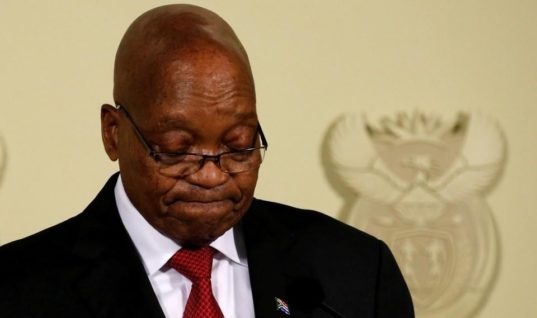
|
|
On Wednesday, Jacob Zuma, the country’s embattled and controversial president, announced his resignation in a televised address to the nation. Zuma’s resignation followed weeks of intense public pressure to step down amid longstanding corruption allegation. The ruling African National Congress (ANC) formally asked Zuma, 75, to resign on Tuesday; he initially refused. The party later announced plans to hold a no-confidence vote against him on Thursday in Parliament. Deputy President Cyril Ramaphosa, who is also the newly elected head of ANC, became the president as of Thursday. Comment: Zuma is considered one of the nation’s stalwarts, having served for 10 years in the Robben Island prison alongside freedom fighter Nelson Mandela. Despite being known as an astute political operator, Zuma’s presidency was characterized by scandal and corruption allegations. South Africa’s Constitutional Court ruled last December that parliament had failed to hold Zuma accountable over the alleged use of state funds to upgrade his rural home in Nkandla. It resulted in an impeachment vote that same month, but the motion failed to pass parliament. (Aljazeera, The New York Times, CNN, BBC
|
|
|
|
|
| |
ZIMBABWE: Opposition leader Tsvangirai dies
| |
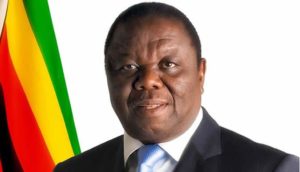
|
On Wednesday, Zimbabwe opposition leader Morgan Tsvangirai died at 65 following a protracted battle with cancer. Tsvangirai’s death comes a few months before Zimbabweans are expected to elect a new president following the resignation of Mugabe, who has been succeeded by Emmerson Mnangagwa. Last week, Tsvangirai took to Twitter to play down speculation that his illness was terminal. “I have cancer and (am) not feeling too well, but I am stable and the process is under control… I am recovering,” he wrote on February 6. Tsvangirai was the veteran leader of the Movement for Democratic Change, and one of the most prominent critics of the former Zimbabwean strongman Robert Mugabe and his ruling ZANU-PF party. His death greatly increases the power of ZANU-PF ahead of elections. Mnangagwa, who took over as President and ZANU-PF leader after Mugabe’s resignation last November, will be the heavy favorite to win the vote. Comment: Tsvangirai was the main challenger to Mugabe in the 2008 elections, and he managed to win 47 percent of the vote against ZANU-PF’s 43 percent in the first round, sending the vote to a runoff. He pulled out of the second round, declaring he could “no longer participate in a race that’s been marred by the widespread intimidation, torture, mutilation and murder” of his followers. Tsvangirai served as prime minister under ex-President Robert Mugabe in the 2009-2013 unity government. (Aljazeera, CNN, NPR, Quartz)
Researched/Written by Brian Adienge
|
|
|
|
|
| |
This week in the Americas & Caribbean
|
|
|
|
| |
CANADA: Canadians are cutting heat and food in order to afford medical prescriptions
On Wednesday, a report released by four universities stated that nearly one million people sacrificed heating and food to afford their high prescription costs. The report also found that more than 1.6 million Canadians have been forced to skip doses or were unable to filled prescriptions because off the cost constraints. The study concluded that prescriptions for mental health concerns, such as anxiety and depression, are most frequently going unpurchased. On Friday, the Canadian Health Minister Adrian Dix said that families earning between USD 15,000 and USD 30,000 will no longer pay deductibles for medication. Comment: While Canada has a universal health care system, it remains the only developed country with no universal drug plan. Canadians currently pay the second highest drug prices in the world, led only by the U.S. (CBC, CMAJOPEN, Global News, Guardian)
|
|
|
|
|
| |
COLOMBIA: Government implements stricter border regulations in wake of Venezuelan exodus
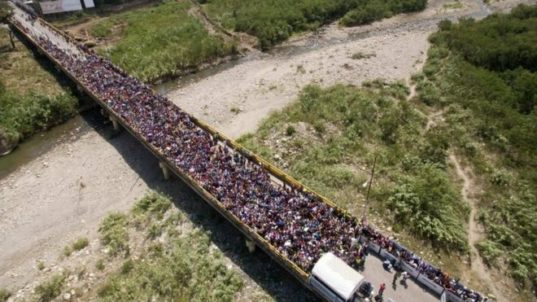
|
|
On Thursday, President Juan Santos ordered border authorities between Venezuela and Colombia to no longer offer temporary border crossing cards. These cards allowed Venezuelans short visits to Colombia to buy food and medicine; currently 1.5 million Venezuelans took advantage of these temporary cards. Colombia deployed 2,120 military troops to ensure that only those with passports or who have already been issued temporary crossing cards are allowed into the country. In addition, the president announced a registry for Venezuelan migrants to make is easier to access employment, education, and health care. A Special Migration Group was created by the Colombian government to reduce border crime. Comment: In the last six months of 2017 Colombia accept more than half a million Venezuelan migrants. Analysists believe that this trend will continue, as the economic and social situation in Venezuela continues to deteriorate. (Colombia Reports, Aljazeera, BBC, Guardian)
|
|
|
|
|
| |
MEXICO: Presidential candidate claims government is spying on him
| |
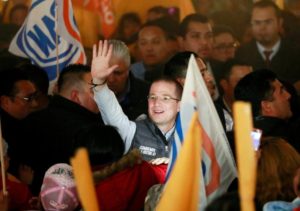
|
On Tuesday, Mexican presidential hopeful and vocal opponent of the current ruling party, Ricardo Anaya, released a video that showed him confronting a driver in a car who appeared to have been following him on the highway. After Anaya’s statement, the current leader in the polls Andres Manuel Obrador also publicly stated he and his family also experience unwanted surveillance. The Interior Department of Mexico, on Wednesday, revealed that government agents had been sent to follow opposition presidential candidates. Comment: In recent months, government surveillance in Mexico received heightened attention with reports of the administration tracking NGOs, journalists, and other politicians. Last year, United Nations human rights experts criticized the current Mexican administration following a University of Toronto report indicating that the administration had used sophisticated spying software to target journalists. (Guardian, Reuters, LA Times, Pakistan Today)
Researched/Written by Connor Murnane
|
|
|
|
|
| |
This week in East Asia & Pacific
|
|
|
|
| |
CAMBODIA: National Assembly passes controversial “lese majeste” law
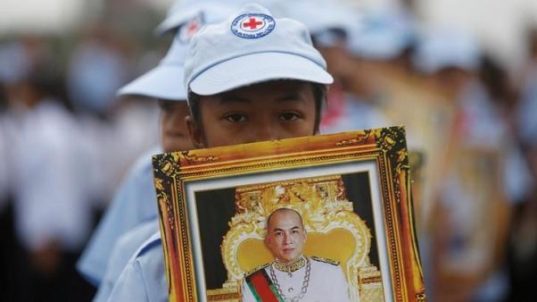
|
|
On Wednesday, the 123 members of Cambodia’s parliament unanimously passed a law that makes “lese majeste,” insulting the monarchy, a criminal offense. A criminal lawsuit can now be filed on behalf of the monarchy against anyone who is deemed to be insulting the royal family. Those found guilty will face between one-to-five years in prison and a fine between USD 500 and USD 2,500. The government defended the law saying it seeks to protect the dignity and reputation of the royal family. Any insult in “words, gestures, writing, painting or objects that affect personal dignity” can now be subject to legal reprisal as a criminal offense. Human rights groups have expressed concerns about the new law, fearing it could be used to target those with legitimate criticisms, crackdown on opposition leaders, and further limit free speech and political activities. Comment: While King Norodom Sihamoni is a constitutional monarchy with a minimal role in public affairs, Prime Minister Hun Sen is the head of the government. Mr. Hun Sen has been in power for three decades and has continuously faced numerous accusations of dismantling the opposition. Last year, the main opposition party was dissolved and its leader, Kem Sokha, arrested on charges of treason. (SBSNEWS, ST, USA TODAY, DW)
|
|
|
|
|
| |
CHINA: Catholics condemn Vatican’s agreement with the Communist government
| |

|
On Tuesday, a group of influential Hong Kong-based Catholics issued a signed letter to bishops across the world expressing their dismay at reports that the Vatican and China are set to reach an agreement on appointing bishops in the country. In the letter, the signatories said were “shocked and disappointed” about the reports. They said the agreement would limit the desired freedom of the church in the country and cause Catholics in the country “to be plunged into confusion and pain.” According to the unconfirmed reports, the agreement would allow the communist party to nominate bishops who are then subject to Vatican veto. The deal would also allow the government-appointed bishops who were excommunicated by the Church to be recognized and regularized by the Vatican. The deal is aimed at rebuilding relations between China and the Vatican, which ended more than 70 years ago. Comment: Last year, President Xi Jinping said religions in China “must be Chinese in orientation,” and the government is the guardian of all religions. The new religious regulations which came into force this month specifies which religious organizations can exist in the country and what activities they can organize. (The New York Times, The Guardian, Washington Post)
|
|
|
|
|
| |
PHILIPPINES: International Criminal Court opens probe into drugs war deaths
On Friday, Fatou Bensouda, the Chief Prosecutor of the ICC, said the court has opened a preliminary examination into President Rodrigo Duterte’s war on drugs to determine whether crimes against humanity had been committed. The examination will investigate the gravity of crimes to determine whether they fall under its jurisdiction. The court’s decision comes 10 months after lawyer Jude Sabio filed the main complaint, alleging the president’s war has caused more than 8,000 deaths. President Duterte’s spokesman, Harry Roque, dismissed the decision calling it “a waste of the court’s time and resources.” Comment: While some killings reportedly occurred during clashes between gangs, Human Rights Watch reported that many incidents involved extra-judicial killings by the police. According to its 2018 report, more than 12,000 people have been killed since 2016. (BBC, UCAnews, CNN, TheGuardian)
Researched/Written by Edgar Peter Mutta
|
|
|
|
|
| |
This week in Europe & Central Asia
|
|
|
|
| |
ALBANIA: Leader signs draft agreement with EU over border management
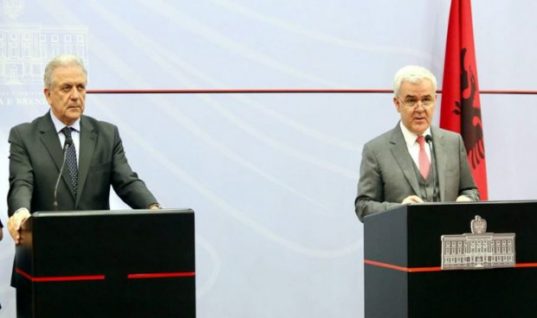
|
|
On Monday, Albania’s Interior Minister, Fatmir Xhafaj, and EU Commissioner for Migration, Home Affairs and Citizenship, Dimitris Avramopoulos signed a draft agreement allowing Frontex, the EU border agency, to deploy on Albanian territory with the intention of overcoming illegal migration and drug trade. The two leaders discussed the agreement, which is the first of its kind, in a joint conference in Tirana. The EU hopes to conclude similar agreements with other Western Balkan countries. To enter into force, the agreement still has to be approved by the 28 EU members states. Comment: Albania has been a candidate member for the EU since 2014 and has made major progress in overcoming the illegal drug trade since then. Avramopoulos said this agreement is a step forward in closer EU-Albania relations. The EU has started discussing similar agreeements with Serbia and Macedonia. (Albanian News , New Europe , Euronews , Reuters)
|
|
|
|
|
| |
IRELAND: Northern Ireland power-sharing talks collapse
On Wednesday, talks at Stormont in Belfast to re-instate Northern Ireland’s power-sharing agreement fell apart between the Sinn Fein and the Democratic Unionist Party (DUP). Ireland’s Taoiseach Leo Varadkar and British Prime Minister Theresa May oversaw the negotiations The key dividing issue is Sinn Fein’s demand for legislation to give the Irish language official status in Northern Ireland. Sinn Fein withdrew from the compulsory power-sharing government that was a central part of the 1998 peace agreement 13 months ago. Comment: On Saturday, Mary McDonald was formally elected the new leader of the Sinn Fein party, while Michelle O’Neill became the Vice President of Sinn Fein. Gerry Adams was the previous leader of the party for almost 35 years and announced his resignation in November. In her victory speech she expressed her desire to win a referendum to unify Ireland. (Irish Times, BBC, Al Jazeera, The Guardian, Reuters)
|
|
|
|
|
| |
REGIONAL: Former Georgian president deported from Ukraine as stateless person
| |

|
On Monday, Ukrainian law enforcement agents detained former Georgian President Mikheil Saakashvili when dining in a Kiev restaurant and deported him to Poland. Saakashvili entered Ukraine in 2015 as a supporter of Ukrainian President Petro Poroshenko, who made him governor of the Odessa region and granted him Ukrainian citizenship. A year later, Poroshenko revoked the citizenship because Saakashvili decided to join the opposition. Since Georgia also revoked Saakashvili’s citizenship when he became Ukrainian, the former president is now a stateless person. Saakashvili blamed Russia, Georgia, and Ukraine for “wanting to get rid of” him. Comment: In 2013, Saakashvili stepped down as Georgian president after being defeated by his rival. He is facing criminal charges in Georgia for gross abuse of power as president, which he states are politically motivated. Georgian MP Alexander Kantaria reported that the country plans to ask Poland to extradite him back to Georgia to serve his sentence. (Kyiv Post, UNIAN, Radio Free Europe/Radio Liberty 1, 2, BBC, Reuters)
Researched/Written by Daniel Boerger
|
|
|
|
|
| |
This week in the Middle East & North Africa
|
|
|
|
| |
JORDAN: The U.S. announces USD 6.375 billion in aid to Jordan
On Wednesday, U.S. Secretary of State Rex Tillerson signed a five-year USD 6.375 billion (USD 1.275 billion a year) aid deal with Jordan’s Foreign Minister Ayman al-Safadi. This assistance aims to support Jordan in a wide range of reform and development programs and mitigate the impact of the country’s refugee burden. The aid package surpasses the agreement with the previous U.S. administration by about 27 percent and increased the duration from three to five years. Comment: Jordan has been experiencing a significant economic crisis since last year, triggered in part by the reluctance of Jordan’s Gulf Cooperation Council (GCC) allies – Saudi Arabia, UAE, and Kuwait – to renew a five-year financial assistance program with Amman worth USD 3.6 billion. Last month, the government raised taxes on food staples such as bread by 50-100 percent, causing demands for the government to resign. (Aljazeera, Jordan Times, Reuters)
|
|
|
|
|
| |
ISRAEL: Police recommends Netanyahu to be indicted for bribery on two charges
On Tuesday, after a 14-month-long investigation, police announced that it has found enough evidence to recommend the indictment of the Israeli prime minister Benjamin Netanyahu for bribery, fraud, and breach of trust. The police recommendations will now go to the attorney general, who will decide whether to prosecute Netanyahu. Netanyahu appeared defiant in a live television address, stating that he intended to stay in power and that the police recommendations would “end with nothing.” Comment: Mr. Netanyahu has faced charges several times in the past, but they have not harmed his political career, nor his popularity.” (Aljazeera, CNN, JPost)
Researched/Written by Mohamed Ismail
|
|
|
|
| |
AFGHANISTAN: Taliban writes open letter to Americans
On Wednesday, the Taliban released an open letter expressing their interest in starting peace talks with the Afghan government and urging the “American people” to put pressure on the Trump administration to start the negotiations. In the letter, the Taliban asks that foreign troops be withdrawn before they will agree to negotiate. They also reference statistics about the number of foreign soldiers killed and highlight the amount of money spent in Afghanistan in an attempt to persuade the U.S. public. So far, the Trump administration has expressed that talks with the Taliban should be led by the Afghan government. A spokesperson for the U.S. State Department stated that “the Taliban statement alone does not show willingness to engage in peace talks. The Taliban’s recent horrific terror attacks in Kabul speak louder than these words…the Afghan government can only negotiate to end the war if the Taliban are ready. The recent attacks show this is not the case.” Comment: The letter was released after a series of deadly attacks in Kabul at the hands of the Taliban reportedly in response to the U.S.’s new and assertive strategy in Afghanistan. (Outlook Afghanistan, TOLOnews, BBC News, The Guardian)
|
|
|
|
| |
BANGLADESH: UN set to monitor the repatriation of Rohingya refugees
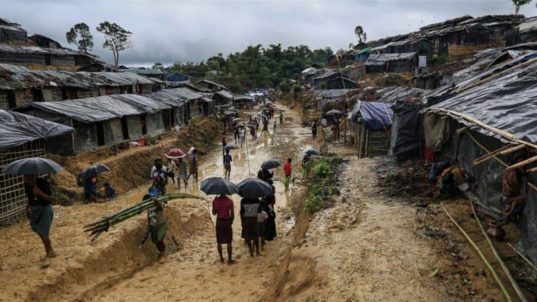
|
|
On Monday, the government agreed to allow the United Nations refugee agency to monitor the process of returning Rohingya refugees to Myanmar. A government representative claimed that the reason for getting the UN officials involved is to avoid being accused of sending anyone back against their will. Refugees will be asked to fill out repatriation forms in the presence of UN officials. The agreement comes a few days after the UK foreign secretary, Boris Johnson, toured a Rohingya refugee camp in Bangladesh. After his visit he emphasized the importance of the process being voluntary, stating that “it is vital that the Rohingya refugees must be allowed to return to their homes in Rakhine voluntarily, in safety and with dignity, under international oversight, and when the conditions…are right.” With Monsoon season due to arrive in March, Rohingya refugees are at risk. Comment: The repatriation process was set to begin last month following an agreement between Myanmar and Bangladesh. A few days before the set date, Bangladesh announced it would delay plans to repatriate Rohingya refugees because they want the process to be voluntary. (Channel NewsAsia, Aljazeera, The Guardian, The Washington Post)
|
|
|
|
|
| |
SRI LANKA: Ruling coalition defeated at local polls
| |
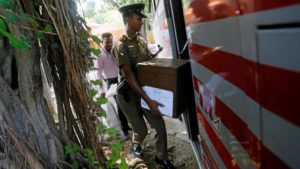
|
On Tuesday, the two-ruling party government announced plans to set up a committee to examine the future of the unity government following their defeat in local elections over the weekend. President Maithripala Sirisena’s center-left Sri Lanka Freedom Party (SLFP) garnered 32.63 percent of the vote, and Prime Minister Ranil Wickremesinghe’s center-right United National Party (UNP) took 8.94 percent of the vote, while the Sri Lanka Podujana Peramuna (SLPP) won 44.65 percent; the SLPP is a political party backed by former President Mahinda Rajapaksa. Former President Rajapaksa, who lost the presidential election in 2015, is urging the government to call a parliamentary election, which is not due until 2020. Furthermore, legislators in the president’s party are asking him to appoint a new prime minister, and the SLPP opposition party says the coalition government must resign. The committee consisting of members from the UNP and the SLFP concluded that the coalition government will continue, and no major changes will be made until the next parliamentary election in 2020. Comment: This is the first local election since the unity government formed in August 2015. (Colombo Page Aljazeera 1, 2, Reuters)
Researched/Written by Pamela Mhute
|
|
|
|

|
|